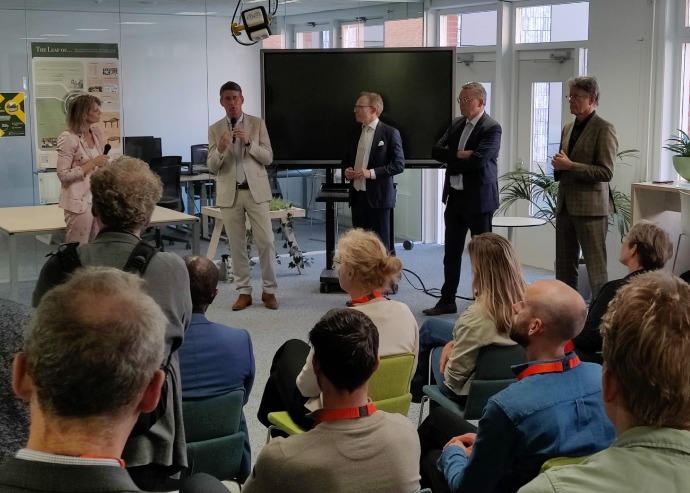Universiteit van het Noorden presenteert zeven hybride onderzoeksgroepen

Tijdens het Impact event van de Hanzehogeschool Groningen presenteert de Universiteit van het Noorden zeven hybride onderzoeksgroepen. Vanuit de Universiteit van het Noorden gaan de Rijksuniversiteit Groningen, Hanzehogeschool Groningen, NHL Stenden, Hogeschool Van Hall Larenstein, UMCG, Noorderpoort en Alfa College samenwerken in deze onderzoeksgroepen, vandaar de toevoeging hybride. De winst ligt hierbij niet alleen bij de vooruitgang van Noord-Nederland maar ook bij de intensivering van de samenwerking tussen mbo, hbo en wo. Het onderzoek binnen de hybride onderzoeksgroepen leidt tot nieuwe inzichten die innovaties, economische groei en maatschappelijke ontwikkeling in de drie noordelijke provincies versterken.
Van labschaal tot pilotschaal
De professoren van de universiteit, lectoren van de hogescholen en practoren vanuit het mbo gaan in deze hybride onderzoeksgroepen samenwerken aan vraagstukken uit de samenleving. Zij richten zich op de maatschappelijke transities waar we in Noord-Nederland voor staan (Energie & Klimaat, Healthy Aging, Digitalisering & Kunstmatige Intelligentie en Governance & Sustainability). Het doel van hybride onderzoeksgroepen is om met deze samenwerking de onderzoeksresultaten sneller toe te passen in het bedrijfsleven en bij publieke organisaties.
De zeven hybride onderzoeksgroepen die worden gepresenteerd, richten zich op Kwaliteit van bestaan bij mensen met ernstig meervoudige beperkingen, Digitale transformatie en geletterdheid’, Gebouwde omgeving, Bioplastics, Human capital, Biobased chemie, Ruimtelijke transformatie water & klimaat.
In 2021 startte de eerste hybride onderzoeksgroep van de Universiteit van het Noorden, Sustainable polymers, waarin de Rijksuniversiteit Groningen, NHL Stenden en Drenthe College samenwerken.
Dick Pouwels - voorzitter College van Bestuur Hanzehogeschool Groningen, namens de Universiteit van het Noorden: 'De kracht van écht effect hebben op de ontwikkeling van mensen en op de samenleving zit in de samenwerking. De hybride onderzoeksgroepen zijn daarvan een mooi voorbeeld. Die samenwerking is natuurlijk niet nieuw, we werken al veel samen binnen deze kennisinstellingen. Maar met deze zeven hybride onderzoeksgroepen wordt ons gezamenlijke mbo, hbo en wo onderzoek flink uitgebreid en tillen we onze samenwerking binnen de Universiteit van het Noorden naar een hoger niveau.'
Waarom samen?
Deze samenwerking in de hybride onderzoeksgroepen moet ertoe leiden dat er daadwerkelijk wordt bijgedragen aan de versterking van de regio: door de innovatiekracht van bedrijven te verbeteren, publieke organisaties verder te ontwikkelen en sociaalmaatschappelijke verbanden - en daarmee de vitaliteit van onze regio en haar inwoners - te verstevigen.
Bovendien wordt zowel het fundamentele- als praktijkgerichte onderzoek versterkt, met als doel dat het werkveld sneller van de resultaten van het onderzoek kan profiteren. Ook intensiveert de integratie van onderwijs, onderzoek en beroepspraktijk (mbo – hbo – universiteit). De hybride onderzoeksgroepen zorgen voor een onderwijsomgeving waarin studenten vanuit het mbo, hbo en wo samenwerken aan onderzoeksopdrachten. Tenslotte komen studenten directer in aanraking met actuele maatschappelijke opgaves, ontwikkelingen en werkgevers in de regio.
